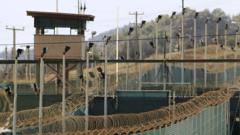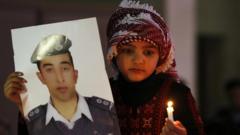The government intervenes to block plea deals that would allow the 9/11 mastermind and his co-defendants to plead guilty without facing the death penalty, resulting in a further delay in their trials.
Plea Deals for 9/11 Plotters Stalled Amid Government Objections

Plea Deals for 9/11 Plotters Stalled Amid Government Objections
The US government successfully delays the guilty pleas of Khalid Sheikh Mohammed and co-defendants, raising questions over plea agreements tied to the 9/11 terror attacks.
In a significant legal development, the expected guilty pleas of Khalid Sheikh Mohammed, the alleged mastermind behind the September 11 terrorist attacks, and two co-defendants have been postponed following an objection from the US government. Initially scheduled for a Friday hearing, the plea agreements struck last July have hit a roadblock as the Justice Department argues that accepting these deals would undermine the government's ability to pursue capital punishment for the accused.
The federal appeals court overseeing the matter has chosen to put procedures on hold while it deliberates on the government's request. The court has not yet decided whether Defense Secretary Lloyd Austin has the authority to retract the plea agreements, which had previously been endorsed by an official he appointed. The timing of this intervention has drawn mixed reactions, with some families of 9/11 victims criticizing the plea arrangements for being overly lenient, while others view them as a potential pathway to finally resolving the protracted case.
The Justice Department, in its filing to the court, expressed concern that allowing the plea deals to proceed would deny the possibility of seeking the death penalty for what it described as "a heinous act of mass murder." Against the backdrop of the September 11 attacks, which left nearly 3,000 people dead, the government is adamant about pursuing the toughest penalties available under the law.
The three defendants, held in custody for over two decades, have faced extensive pre-trial hearings spanning more than a decade, with significant focus on the controversial techniques employed during their CIA detention, raising questions about the integrity of the evidence obtained. Khalid Sheikh Mohammed underwent severe interrogation measures, including simulated drowning and sleep deprivation, which have been criticized by human rights advocates as forms of torture.
In response to the delays, family members of victims have expressed frustration and hopes for resolution. Some, like Terry Strada, who lost her husband in the attacks, have decried the plea deals as catering to the rights of the detainees in Guantanamo Bay. Others, such as Stephan Gerhardt, whose brother was also a victim, see these deals as a necessary compromise that could finally lead to convictions for the accused, emphasizing the urgency as the defendants age and their health declines.
The continued pauses in this high-profile case underscore the complexities involved in bringing justice to the families affected by the attacks, amid ongoing debates about the philosophic implications of capital punishment and accountability.


















